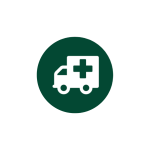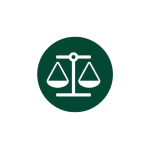New Jersey State Resources

This page has information specific to this state, including contact information for federal and state agencies, and some key information about laws and consumer protections. Sometimes, state laws are more protective than federal law. For more information on this state's specific laws (e.g., on employment or health insurance), visit Triage Health's Charts of State Laws.
Browse Resources
Advocacy

- For more information on state services, state agencies, and elected officials, you can view the state government website.
- For more information on how to register to vote in this state, visit the New Jersey Secretary of State's website.
- View state legislative information, including the legislature's daily schedule and information on current legislative bills.
- For additional information and resources related to advocacy, visit Triage Cancer's Advocacy Resources.
Disability Insurance

State Disability Insurance
- For information about your state's short-term disability insurance program, visit the New Jersey Division of Temporary Disability and Family Leave Insurance, or call 609.292.7060.
Federal Disability Programs
- The Social Security Administration (SSA) administers two disability benefits programs: Social Security Disability Insurance (SSDI) and Supplemental Security Income (SSI). For more information on each program and how to apply, visit the SSA Disability Benefits website.
- SSI provides monthly financial assistance to individuals who have: 1) a disability, or are age 65 or older, 2) a low-income level, and 3) low resources. Some states add money to the federal SSI payment. You can learn more about New Jersey here.
- Find your local SSA office
- For more information on disability insurance, visit Triage Health's Disability Insurance Resources.
Private Disability Insurance
- You can also purchase short-term and/or long-term disability insurance directly from a private insurance company or this type of insurance may be offered by your employer as an employee benefit. See our Quick Guide to Long-Term Disability Insurance for more information.
Employment

Federal Fair Employment
- The U.S. Equal Opportunity Employment Commission (EEOC) is responsible for enforcing federal laws that make it illegal to discriminate against a job applicant or an employee because of the person's race, color, religion, sex (including pregnancy, transgender status, and sexual orientation), national origin, age (40 or older), disability, or genetic information. The laws apply to all types of work situations, including hiring, firing, promotions, harassment, training, wages, and benefits. For more information about the EEOC, including how to file a complaint, visit the EEOC's website, call 800.669.4000, or email info@eeoc.gov.
- The Job Accommodation Network (JAN) is a program funded by the U.S. Department of Labor, that provides free, expert, and confidential guidance on job accommodations and disability employment issues. They also have several resources on how to approach an employer to request a reasonable accommodation under the Americans with Disabilities Act and a Searchable Online Accommodation Resource where individuals can find suggested accommodations based on job duties or limitations that they are experiencing. For more information, visit the JAN website, call 800.526.7234, or email jan@AskJAN.org.
State Fair Employment
- To learn more about your state's fair employment laws, including information about discrimination in the workplace and how to file a complaint, visit the New Jersey Department of Law & Public Safety, Division on Civil Rights website or call 1.833.653.2748.
State Unemployment
- New Jersey's program is administered by the New Jersey Department of Labor and Workforce Development.
- File an unemployment claim online
- File over the phone: 201.601.4100 (North New Jersey); 732.761.2020 (Central New Jersey); 856.507.2340 (South New Jersey); 888.795.6672 (out-of-state) (you must call from a phone with an out-of-state area code); New Jersey Relay 711
- Customer service
- Certifying benefits
- Unemployment guide book
- Current weekly benefit amount and maximum length of benefits
- Payment is available via debit card or direct deposit. Claimants must make at least one job search contact per week when claiming benefits and must keep a record of the job search.
Vocational Rehabilitation
- Your state's Vocational Rehabilitation agency provides vocational rehabilitation services that are designed to help job seekers with disabilities obtain competitive employment in integrated work settings. For more information on their services, eligibility requirements, and how to apply, visit the New Jersey Department of Human Services website, or call 973.648.3660.
More Information
- For more employment resources, visit Triage Health's Employment Topics Page.
Employment - Taking Time Off

Federal Leave Laws
- The U.S. Department of Labor Wage & Hour Division enforces the Family & Medical Leave Act (FMLA) (866.487.9243). The FMLA is a federal law that allows eligible employees to take up to a total of 12 weeks of unpaid, job-protected leave per year under certain circumstances.
State Family & Medical Leave (for self & for caregivers)
- Some states have family & medical leave. New Jersey's Paid Family Leave law allows an employee to take up to 12 weeks off to provide care for a family member or to bond with a new baby. The law does not allow an individual to take time off for their own medical reasons.
State Paid Family Leave (for caregivers)
- Department of Labor and Workforce Development, Division of Temporary Disability and Family Leave Insurance
- Who’s eligible? Employees who worked 20 calendar weeks in a base year. Additionally, employees must have earned $240 or more per week or $12,000 or more during the base year.
- Who can be cared for? A family member who is seriously ill or injured. “Family member” includes parents, spouse, children of any age, parents-in-law, siblings, grandparents, grandchildren, domestic partners, chosen family, any other individuals related by blood, or any other individuals with whom you consider to be family.
- How much time is given? Up to 12 consecutive weeks (84 days) or up to eight weeks (56 days) of intermittent leave in a 12-month period.
- How much is paid? Benefits are based on the employee's average weekly wage, up to $993/week.
- How do I apply? Online, by mail (Division of Temporary Disability and Family Leave Insurance), or by phone at 609.292.7060.
State Paid Sick Leave (for self)
- New Jersey passed an earned sick leave law which became effective on October 29, 2018. Most employees in New Jersey are covered under this law. The law requires that employees accrue paid leave at a rate of at least one hour per every 30 hours worked. Employees may not use more than 40 hours of paid leave per each 12-month period. Learn more about New Jersey paid sick leave.
- Some states have kinship laws that allow you to use your sick leave to care for a child. New Jersey allows an employee to use their sick time to provide care for a family member.
State Paid General Leave (for any reason)
- Some states provide general paid leave. New Jersey does not currently have a general paid leave law.
State Bone Marrow Donation Leave
- Some states provide leave to donate bone marrow. New Jersey does not currently have a leave law specific to bone marrow donations for most employers, however state employees are entitled to up to 5 days for bone marrow donation (and up to 30 days for organ donation).
County & Local Leave
- Some cities and counties have additional leave laws.
Workplace Leave Policies or Employment Contracts
- Everyone’s situation is different. Check your employee handbook, your workplace policies, and/or your employment contract (if you have one) to see whether you are eligible to take paid or unpaid time off from work.
More Information
- For more information about leave laws in each state, see our chart on taking time off from work.
- For more employment resources, visit Triage Health's Employment Topics Page.
Estate Planning

Finances

For information on financial assistance resources, you can visit our Financial Assistance Resources module. You can then pick from the different categories of financial assistance, to find organizations that may provide financial help to you. Think creatively. For example, if you cannot find anything to help with your medical bills, you may qualify for utility assistance and shift the money you had dedicated to utilities to your medical bills.
- For assistance with managing your finances, including budgeting and dealing with creditors, visit the National Foundation for Credit Counseling.
- Bankruptcy may be an effective way to eliminate medical debt, credit card debt, and/or other types of debt. Learn about filing for bankruptcy for free in New Jersey, and visit Triage Health's Quick Guide to Bankruptcy.
- Visit Triage Health's Navigating Finances Resources for more information about ways to manage your finances.
Health

- To find general information about health insurance and other types of insurance offered in your state, as well as to learn more about specific insurance companies, agents, or brokers, visit the New Jersey Department of Banking and Insurance website, or call 609.292.7272 or 800.446.7467
- For more information and resources on health insurance, visit Triage Health's Health Insurance Resources.
Marketplace
- For information about options for buying health insurance from private insurance companies, as well as whether you are eligible for marketplace financial assistance, visit the Get Covered New Jersey website, or call 833.677.1010.
COBRA
- COBRA provides a way for workers and their families to temporarily maintain their employer-provided health insurance during situations such as job loss or a reduction in hours worked. If you have questions about COBRA, visit the Employee Benefits Security Administration website or call 866.444.3272.
State COBRA
- For information about your state's COBRA law related to maintaining employer-provided health insurance during situations such as job loss or a reduction in hours worked, as well as information about how your state's law works with federal COBRA, visit the New Jersey Department of Banking & Insurance Small Employer Health Benefits Program website, or call 609.292.7272 or 800.446.7467
Children's Health Insurance
- Visit this site to learn about the Children's Health Insurance Program (CHIP) (800.701.0710), which provides low-cost health coverage to children in families that earn too much money to be eligible for Medicaid.
- Visit InsureKidsNow.gov to learn about free or low-cost health and dental insurance coverage options for kids and teens
More Insurance Information
- For more information and resources on health insurance, visit Triage Health's Health Insurance Resources.
- To apply for an Independent Medical Review (an external appeal of a health plan denial) or to file a Consumer Complaint about your health plan, visit the Independent Health Care Appeals Program website,
- If your health insurance company has denied coverage for your care, you can appeal that decision. The process depends on the type of health insurance that you have.
- If you have private health insurance (e.g., through an employer or the Marketplace), you can also file an external appeal with an entity outside of your insurance company, to see if the insurance company is required to cover your care. The external review process is either handled by the state’s insurance agency or the U.S. Department of Health & Human Services. Visit our Chart of State Laws on Health Insurance Coverage & Navigation to see who runs the external appeals process in your state.
- Medicare is the federal health insurance program for people who are 65 or older, certain younger people with disabilities, and people with End-Stage Renal Disease or ALS. For information about Medicare, to create a personal account where you can view your Medicare information, and to learn about plan options, visit Medicare.gov, or call 800.MEDICARE (800.633.4227)
- Download a copy of Medicare's handbook, “Medicare & You.”
- For help navigating Medicare, contact the Senior Health Insurance Assitance Program. Find the telephone number of your local office.
- For more information, visit Triage Health's Medicare Resources.
- Medicaid provides free or low-cost health coverage to eligible individuals, including people with low-incomes, families, children, pregnant women, the elderly, and people with disabilities. Each state has its own rules for eligibility. Read Triage Health's Quick Guide to Medicaid to learn more.
- Visit this site to see if you are eligible for Medicaid in your state.
- Visit this site for information about how to apply for Medicaid in your state.
- Visit this site to learn more about Medicaid benefits in your state.
Early & Periodic Screening, Diagnostic, & Treatment (EPSDT)
- The EPSDT benefit is a Medicaid benefit available to individuals under the age of 21.
- States are required to provide comprehensive services needed to correct and ameliorate health conditions, including:
- Early: Assess and identify problems early, starting at birth
- Periodic: Check children’s health at periodic, age-appropriate intervals in comprehensive well-child visits, including health education
- Screening: Provide physical, dental, mental, developmental, hearing, vision, and other screening or laboratory tests to detect potential problems
- Diagnosis: Perform diagnostic tests and assessments to follow up when a risk is identified during screening and examinations
- Treatment: Control, correct, or ameliorate any problems that are found
- States are required to provide any additional health care services that are coverable under the federal Medicaid program and found to be medically necessary to treat, correct or reduce illnesses and conditions discovered regardless of whether the service is covered in a state's Medicaid plan. State Medicaid agencies are required to:
- Inform all Medicaid-eligible individuals under age 21 that EPSDT services are available and of the need for age-appropriate immunizations;
- Offer and provide, if requested and necessary, assistance with transportation to medical care.
- Offer and provide, if requested and necessary, assistance with scheduling appointments for EPSDT visits and services.
- Learn more about your state's program.
Coverage for Children
- Visit this site to learn about the Children's Health Insurance Program (CHIP) (800.701.0710), which provides low-cost health coverage to children in families that earn too much money to be eligible for Medicaid.
- Visit InsureKidsNow.gov to learn about free or low-cost health and dental insurance coverage options for kids and teens.
In-Home Support Services (IHSS)
- Visit this site for information about a Medicaid program that helps seniors and people with disabilities to stay in their homes, by providing in-home caregiving services, such as help with activities of daily living, household chores, grocery shopping, etc. Some states allow family members to get paid as caregivers.
More Medicaid Resources
- For more information, visit Triage Health Medicaid Resources.
- For a list of Hill-Burton Federally Funded Health Centers that are obligated to provide free or reduced-cost health care, visit the Health Resources & Services Administration (HRSA) website.
- Federally Qualified Health Centers (FQHC) are community-based health care providers that provide primary care services in underserved areas. To search for an FQHC in your state, use the Find a Health Center tool on the HRSA website.
- To find a community clinic in your area: screenings and services in your area, visit the National Association of Free & Charitable Clinics website.
- The National Breast & Cervical Cancer Treatment Program (NBCCEDP) provides breast and cervical cancer screenings and diagnostic services to women who have low incomes and are uninsured or underinsured. For more information about screenings and services in your area, use the CDC search tool.
- The New Jersey Cancer Education and Early Detection (NJCEED) Program provides comprehensive outreach, education and screening services for breast, cervical, colorectal and prostate cancers.
Women's Health & Cancer Rights Act (WHCRA)
- WHCRA provides protections for individuals who have had a mastectomy. For more information, visit the Employee Benefits Security Administration website.
Privacy
- HIPAA sets rules about health information privacy. To learn more, read this document on sharing health information with family members and friends.
- For more information about HIPAA and to file a HIPAA complaint, visit the Department of Health & Human Services website.
- To learn about making educated disclosure decisions, visit Triage Health's Quick Guide to Disclosure, Privacy, & Medical Certification Forms.
State Clinical Trials Law
- NJ has a voluntary consensus agreement that applies to nine insurers all of whom are members of the New Jersey Association of Health Plans. Accordingly, routine health cost coverage is limited to Phase I, II, and III of cancer clinical trials taking place within the state. A trial qualifies for coverage is if it authorized or approved by one of the following: (1) NIH, including cooperative group trials and trials at NCI cancer centers, (2) U.S. F.D.A., (3) U.S. Dept. of Defense, or (4) U.S. Dept. of Veterans Affairs.
(Last updated 8/2022)
More Health Insurance Resources
- For more information and resources on health insurance, visit Triage Health's Health Insurance Resources.
Housing

- For information on fair housing laws in your state, or if you think you have experienced housing discrimination, visit the Attorney General's Housing Discrimination website.
- For more information, visit our Financial Assistance Resources module or our Cancer Finances module on Housing Rights & Financial Help.
Legal Assistance

- For more information on ways to find legal assistance and what to consider before choosing a lawyer, read Triage Health's Quick Guide to Legal Assistance.
- If you are having difficulty finding a lawyer in your area, you can use the American Bar Association's Lawyer Referral Directory to search for your state and local bar associations. In some states or counties, these bar associations provide referrals to free or low-cost services for individuals with cancer.
- Lawhelp.org provides a search feature for free legal aid programs, legal information, and legal forms related to your state.
- For information about Medical-Legal Partnership programs in your state, visit the American Bar Association's Medical-Legal Partnership Locator.
- To learn more about Navigating the Legal System, visit Triage Health's Legal Assistance Resources.
Transportation

- Local transit systems may provide free or discounted rates for low-income individuals and families. Some cities also offer bus passes, vouchers for taxi or ride-sharing services, or shuttle services for patients traveling to cancer treatments.
- Dial 211 for assistance.
- For more information on financial assistance resources, visit our Financial Assistance Resources module.
